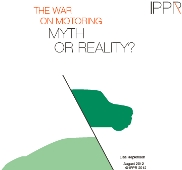9/4/2012
UK Labour Party Denies War on MotoristsGroup close to the Labour Party argues UK government is not waging war against motorists.

A thinktank closely allied with the British Labour Party issued a report last month denying the existence of a war on motorists. Politicians, particularly those on the left, have been increasing taxes and fees on drivers so that the extra money could be spent on public transportation and other non-motoring priorities. The Institute for Public Policy Research (IPPR) argues these increased costs are justified.
"While spending on roads is not commensurate with motoring tax revenue, there is no good policy justification for making these two figures balance: road investment should be justified on grounds of wider transport objectives and needs," the IPPR report claimed.
The UK has 35.3 million licensed drivers who collectively drive 303 billion vehicle miles per year. In the past two decades, motoring taxes on these individuals increased 50 percent in real terms. Fuel taxes now account for 58 percent of the cost of gasoline, giving England the sixth most expensive fuel out of twenty-seven European Union nations. By 2010, the UK raised £32 billion (US $50 billion) from fuel taxes and the vehicle excise duty (VED) combined. Out of this amount, only £9 billion (US $14 billion) -- 28 percent -- was spent on roads. IPPR approves this ratio, claiming it covers the external costs of motoring such as noise and carbon dioxide emissions which it calculates to have costs of £56 billion (US $89 billion).
"There are also many costs which are difficult to estimate but are not trivial, such as community severance, disruption to tranquillity and landscape, and waste and water pollution," the IPPR report argued.
Between 2001 to 2011, the cost of transit increased 62 percent. In 2010, for the first time, the UK government spent more money on public transit than the national road system. IPPR compared the cost of driving to various rail and bus options at varying distances and found the car was less expensive in almost every case. Raising taxes on cars to subsidize bus service is meant to level this difference.
"While undoubtedly there are many benefits of car travel, society's increasing dependence on the car as the dominant mode of travel has led to increasing unfairness," the report claimed. "On one hand, many people do not have access to a car and so are limited in their access to places and services; on the other, some are forced to have a car by a lack of public transport options."
The group also insisted the tax on fuel helps encourage environmental responsibility and reductions in automobile use. These policies, the report argues, justify the government's driving up the cost of motoring.
"Put simply, there is no war on motorists," the report concluded. "Fuel duty and VED are both effective and justifiable motoring taxes that not only encourage greater fuel efficiency but go some way to offsetting the environmental and social costs of motoring. Recent government reductions or delays to planned increases in fuel duty in particular are not justified in terms of sound public policymaking."
A copy of the report is available in a 1mb PDF file at the source link below.


